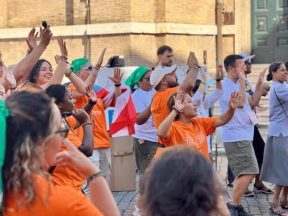Music. Cape Verde. The Cimboa Soldier.
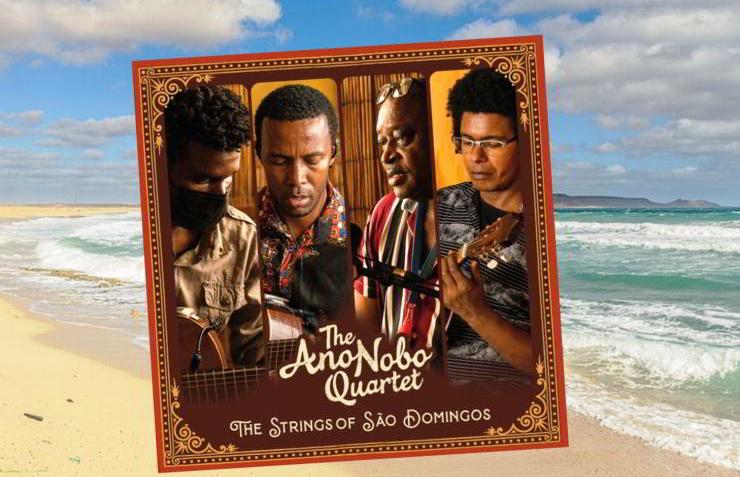
Pascoal was a soldier for 30 years and now leads the “Ano Nobo” quartet, with which he also carries on a tradition that is disappearing. We talked with him.
After the military missions came the musical missions. Born in 1960, Domingos da Resurreição Andrade da Silva Fernandes, aka simply as Pascoal, his family nickname, was for thirty years, from 1978, a soldier in the Cape Verdean army: part of the FARP, the Forças Armadas Revolucionarias do Povo, who from independence in ’75 until ’90 maintained the name they had as the armed wing of the African Party for the Independence of Guinea and Cape Verde (PAIGC) – the organization which under the leadership of Amilcar Cabral fought for the liberation of the two countries from Portuguese colonial rule – to be later renamed the Cape Verdean Armed Forces.
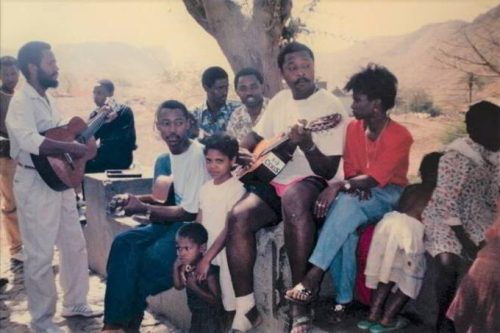
Pascoal with friends and family in Cape Verde, 1980s. Photo: PAM
“In ’79-80 I went for military training in Cuba – says Pascoal -. As a boy, I had learned to play the guitar, and in Cuba, where we were about thirty soldiers from Cape Verde and São Tomé, we also made music, we had electric instruments at our disposal, and I was part of a musical group that included ten different nationalities. Later I was sent for four years to Crimea, which was then part of the Soviet Union, and there was a musical band with soldiers of twenty-one nationalities; I remember that we had also formed a group with a choir of South Africans and two guitars, the guitarists were myself and a soldier from Madagascar. In the USSR, where I received training as a truck and car technician, I participated in festivals in Odessa and Kyiv; but I have also been to other parts of the world Brazil, for example, at a choir festival. Since in my first years as a soldier in Cape Verde, there was a single party, there were many political-cultural activities within the armed forces. It was a great experience, apart from the homesickness when I was far from home“. Ano Nobo is the musical formation with which Pascoal recorded the album The Strings of São Domingos, released in 2022 by the New York label Ostinato Records. Ano Nobo is a quintet, four guitars plus a cavaquinho (a small guitar coming from Portuguese popular music which, perhaps via Brazil, has taken root in Cape Verdean music) or a bass guitar, with Pascoal as the main vocalist: acoustic music, but above all live, it exhibits a lush, enveloping, galvanising sound.
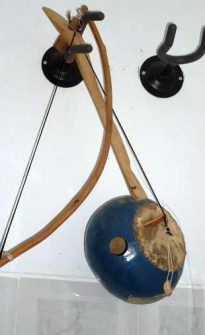
Cimboa is a bowed instrument from Cape Verde. Photo: Xandu/Pentagrama Music
The name of the group is a tribute to the musician from whom Pascoal learned to play the guitar, and with whom he then collaborated when he was not travelling around the world as a soldier: Fulgêncio da Circuncisão Lopes Tavares, born in 1933 in São Domingos, the city of Pascoal, on the island of Santiago, like Praia, died in 2004. “Both his grandfather and father were musicians; his father was a composer of morna pieces and the teacher of the municipal band of Praia. Ano Nobo was born in the early hours of January 1st, and for this reason, he was nicknamed “New Year”.
As a boy, he began playing the cavaquinho and the guitar. After primary school, he attended high school in Praia, where he met great musicians of that era, such as Franck Mimita and Bilocas, and began composing. When he returned to São Domingos, he missed the group of musicians with whom he was used to playing and serenading. So, he began to teach others, to recreate the same type of situation he had experienced in Praia. His legacy is represented by several generations of musicians who were his students, starting with those who were children and are now eighty years old or older. Ano Nobo was one of the greatest masters of Cape Verdean music, and starting from him there came a fundamental transmission of knowledge of stringed instruments and musical traditions”.
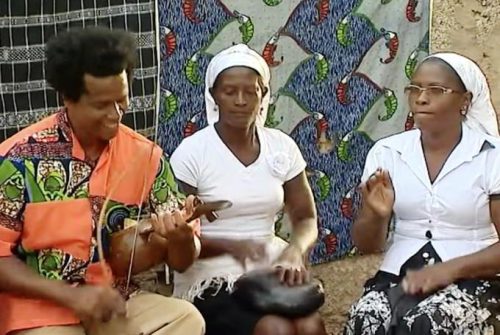
Playing Cimboa. Observatório da Língua Portuguesa
A prolific composer, Ano Nobo was renowned above all for his talent in the coladera genre, and several of his songs became hits, particularly in the 1960s and early 1970s; but, though very busy as a teacher, musician and author, Ano Nobo also found the time to bring eighteen children into the world. Three, Fany, Afrikanu and Nonó, are part of the group named after him, while Kim di Nanda was, like Pascoal, his student. “With our group, we offer traditional Cape Verdean music in its most genuine form – genres such as morna, coladera, batuque, funaná – with an influence of the tradition of music played with stringed instruments in São Domingos: the idea is to convey this type of heritage to the new generations”. A heritage that Pascoal also transmits by teaching in a school in São Domingos.
A Living Tradition
Sometimes Pascoal abandons the guitar to switch to the cimboa, a single-string violin with a sound box made of a calebasse or a coconut and goatskin. “In 2006, by chance, I was at an event in Praia, and I heard that Manu Mendes, the last cimboa expert, had died. Then I discovered that Manu Mendes was actually still alive, but this made me think that something had to be done to preserve the memory of the cimboa. So, I did a week of apprenticeship with Manu Mendes. In fact, there were two other masters of the instrument who were still alive. In 2007 I spent a few days in Terrafal with Eugenio Mendes, and I also learned the cimboa construction technique from him. So, in 2009 I went to Santa Cruz from Roque Sanches (both Terrafal and Santa Cruz are on the island of Santiago, ed.)”.Manu Mendes died in 2008 at eighty-two and Roque Sanches died in 2023 at the age of ninety-two; only Eugenio Mendes remains he is over eighty and is undergoing treatment in Portugal.
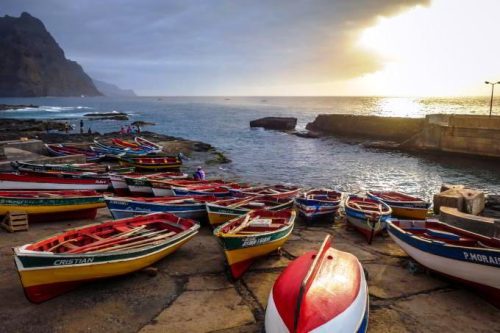
Cape Verde. Harbor at sunset in Santo Antao island. Daboost/123rf
“The cimboa is on the verge of extinction, and this is the reason why I conceived its valorisation as a second motivation for our Ano Nobo quartet: the preservation of its memory, diffusion and also insertion of the instrument into other musical genres because traditionally the cimboa was used almost exclusively for the accompaniment of the batuque. It is the first Cape Verde stringed instrument that was not brought from Europe or the Americas, it is the only instrument from the archipelago that came from Africa, where instruments of this type exist throughout the continent, as well as in the Middle East and Asia: the cimboa is also a testimony of the transit of slaves to Cape Verde. Nowadays it is difficult for the cimboa to fit into the context of the batuque, so we need to be able to reawaken the interest of young people in this instrument, which brings with it many implications, and requires a lot of patience and a lot of application”.
Marcello Lorrai



